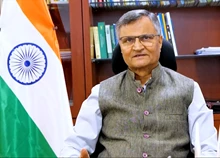
According to a group of scientists, the total cost of implementing nationally determined contributions (NDC) for climate action in African countries will be $2.8 trillion between 2020 and 2030. According to the Climate Policy Initiative, an advisory organisation, the countries rely on external financial support for approximately $2.5 trillion of the cost.
African governments have committed $264 billion in domestic public resources, accounting for roughly 10% of the total cost. To meet the 2030 climate goals, Africa will require approximately $250 billion per year. The total annual climate finance flows in Africa for 2020, both domestic and international, were only $30 billion, according to the report.
In four of the five African sub-regions, mitigation accounts for the majority (66%) of reported climate finance need. Individually, it accounts for 77% of the total need in Western Africa, 75% in Southern Africa, 70% in Central Africa, and 57% in Eastern Africa.
The transportation sector was projected to require the most climate finance (41%, $657 billion). Agriculture, forestry, and other land-use sectors, which emit the most greenhouse gases, account for only 7% of total needs ($108 billion).
They added that South Africa, Ethiopia, Nigeria, and Egypt have the highest annual financing needs, totaling nearly $151 billion. According to the authors, the total cost projection includes loss and damage estimates from 51 of 53 African countries.
According to the researchers, the climate finance figures are likely underestimates due to a lack of capacity and data from sub-national governments and vulnerable communities. According to a report published by GreenCape, a South African green energy advocacy organization, and the Bertha Centre for Social Innovation and Entrepreneurship, an educational institution part of the University of Cape Town, in collaboration with CPI, a gap in climate finance data is making implementation of climate goals increasingly difficult in South Africa.
Despite the continent's high vulnerability to climate change, adaptation to climate change accounted for only 24% of total climate finance needs identified.
Adaptation needs were primarily reported for agriculture (25%), water (17%), infrastructure and building (12%), disaster prevention and preparedness (10%), and health (10%) in countries that provided sector-specific data (8 per cent). Up to 10% of total climate finance has been allocated to dual benefit actions that include both mitigation and adaptation. Northern Africa is the only subregion with a nearly equal distribution of adaptation and mitigation needs.
According to the report, the private sector has significant potential to meet Africa's climate finance needs, but NDCs rarely address it. However, according to the report, the majority of current climate financing in Africa comes from public actors (87%, $20 billion), with only a small amount coming from private actors.
The authors urged the United Nations Framework Convention on Climate Change (UNFCCC) to develop international guidance to assist countries in more comprehensively determining and estimating their needs. Needs can be determined at the national level through national investment plans related to NDCs, as well as climate finance strategies related to national policies.











